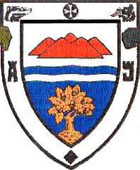Alba - Bro Skoz
Scotland - Ecosse
Carriden
Velunia / Veluniate

West Lothian
***
Encyclopédie Marikavel-Jean-Claude-EVEN/Encyclopaedia/Enciclopedia/Enzyklopädie/egkuklopaideia
|
Alba - Bro Skoz Scotland - Ecosse |
Carriden Velunia / Veluniate |
West Lothian *** |
| page ouverte le 12.06.2006 |
|
forum de discussion
* forum du site Marikavel : Academia Celtica |
dernière mise à jour
16/04/2010 13:32:58 |
![]()
|
Définition : nom de lieu d'Écosse, sur la rive sud du Firth of Forth, dans le comté de West Lothian. Autrefois camp romain Velunia / Veluniate, à l'extrémité est du Mur d'Antonin, sur la mer du Nord. |
|
![]()
|
i
Extrait de la carte Ordnance survey : Map of Roman Britain. Carriden est encadrée de rouge |
![]()
|
i
Extrait de la carte Ordnance survey : The Antonine Wall. La forteresse de Veluniate est indiquée par un carré rouge |
![]()
|
Etymologie : * Rivet & Smith, p. 490 : "SOURCES - Inscription : JRS, XLVII (1957), 229-30 (= Burn, 1969, No. 135, pp. 104-105) : an altar set up by the VIKANI CONSI[S]TENTES CASTEL[LO] VELUNIATE, found at Carriden in 1956; - Ravenna 10752 (= R&C 191) : VELUNIA.
In etymology the name is probably related to British *vellaun- perhaps 'good', for which see BOLVELLAUNIUM; hence perhaps 'goodly (place)'; if there is -ate. suffix, see ATREBATES. The notable aspect of the name, whose vowel is guaranteed by the inscription (not later than the end of the second century) and not simply by Ravenna, is that whereas other Romano-British names based on *uellaun- all retain the -au- in fossilised form, here this diphthong has evolved not merely to -o- as in Alone, Aliene, but beyond that to -M-, a development which Jackson LHEB 306 & 313 says occurred by the end of the third century. It thus records a second-century form taken from British speakers at the time of the occupation of the vicus at the fort, and represents a later stage than first-century names taken into official Latin usage with -au-. See also ALAUNA(1). IDENTIFICATION. The Roman fort at Carriden, West Lothian (NT 0280). |
![]()
|
Sources : * ALF RIVET & Colin SMITH : The Place-Names of Roman Britain. Batsford Ltd. 1979. * Ordnance survey : Map of roman Britain. 3è édition. 1956. * Ordnance Survey : The Antonine Wall. 2,5 inch map. 1969 - envoi de ** |
![]()
|
Liens électroniques des sites Internet traitant de Carriden / Velunia - Veluniate : forums de discussion :* forum du site Marikavel : Academia Celtica hast buan, ma mignonig go fast, my little friend |
![]()